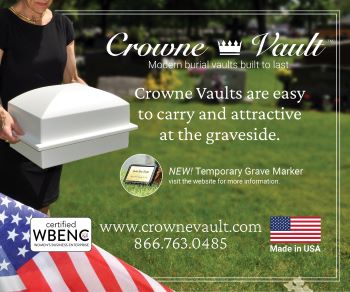Death care receives criticism on three continents
 I’ve operated and managed a thriving funeral home. If you’ve been there and done it. . . you know it is 24/7/365. . . .not many days go by when you don’t worry about something. And, I’ve dealt with grieving family members, regulators, and the consumer movement too. When you operate a community funeral home, there is a lot to do. . . . . and a lot of people who will tell you how to do it better — whether they’ve ever been on the front lines of funeral service or not.
I’ve operated and managed a thriving funeral home. If you’ve been there and done it. . . you know it is 24/7/365. . . .not many days go by when you don’t worry about something. And, I’ve dealt with grieving family members, regulators, and the consumer movement too. When you operate a community funeral home, there is a lot to do. . . . . and a lot of people who will tell you how to do it better — whether they’ve ever been on the front lines of funeral service or not.
I’m not really complaining and I’m not really saying I don’t believe the death care profession should be unregulated. I’m happy we are regulated and I think those of us that cannot consistently give consumers what they were promised should have a way to be removed from our industry. Market forces seem to have a way of doing that over time anyway.
It’s just that it seems that when you are working hard every day to satisfy the needs of those who have lost loved ones, there is always somebody in the news telling the consumer public that there is a lot wrong with the death care profession.
I noticed three articles in the news in just the last couple of days with issues that put our professions in a bad light. And, the articles come from three different countries and three different continents — North America, Australia, and Great Britain. The articles are not wrong, they are intended for our profession to do things better for the consumer. . . . .but if you are a consumer and read them you might get the idea that the funeral business is shady and does nothing right for the consumer. . . .and that is far from the truth.
Great Britain — This article entitled “UK Financial Conduct Authority (CMA) confirms measures to raise standards in the Funeral Plans Market” concerns new regulations in Great Britain about preneed funeral plans. According to the article “the new rules will introduce high standards in the funeral plans market and require firms to ensure that plans are sold fairly, perform as expected, and provide value for money”.
Among other things, the CMA will require that funeral plans that are fully paid for will always deliver a funeral and must guarantee that. . . i.e. in my opinion that means no funding shortfalls. The CMA will also ban “cold calling” and new standards of advertising will be implemented.
The CMA also states “As we take over the regulation for this market, we will be rigorously assessing a firm’s fitness to operate. Firms that want to continue conducting funeral plan activities after regulation should prepare now so that they can apply for authorisation as soon as possible. . . . . . Any firms that are not authorised or do not become Appointed Representatives by July 29, 2022, will have to cease trading in funeral plans. . . “
There are some good standards in here, but it is hard for me to believe that the publication of this type of document will not have detrimental public relations to the funeral, cremation, and preneed industries.
The United States —This article entitled, “New Jersey does very poor job explaining funeral rights to consumers. . ” is not an indictment on the funeral homes and cemeteries of the state, but on the State Board of Mortuary Science of New Jersey.
Those of us in the profession will notice it is published by the Funeral Consumers Alliance (FCA) which is certainly not a moderate middle of the road group. One could argue that for many years they have been anti-funeral. With this report they state “There’s no clearly labeled consumer information link. All of the questions under frequently asked questions, none of them are for consumers.” And they suggest, “. . New Jersey’s funeral regulatory agency does not see itself as primarily serving the consumer. I think they see themselves serving the industry,” the spokesman said.
Furthermore, the FCA gives New Jersey a grade of “D”. The article states that 26 states received a “D” and seven earned an “F” grade from them. In my opinion, putting 2/3 of American states in a “D” or “F”, using only their, potentially slanted standards category, is simply wrong.
Australia — This press release from eziFunerals is entitled “Funeral Directors query online cremation claims” and, in part, asks consumers to know what they are getting when they purchase online cremation services. From my point of view, the press release is an obvious push in favor of using full service crematory operators when looking for direct cremation.
There is nothing wrong with that, but it does put all online cremation services somewhat in the same bundle. . . and just like with traditional funeral homes, cemeteries, and other businesses, things such as quality of services and value for your money are not easily comparable nor are they objective data that can be confirmed easily. . . . .those types of emotions, quality and value, are subjective in terms and there may be some very good online cremation operators who rate higher in those categories than traditional funeral homes.
My reason for writing this today is not a push to look for self-improvement in what you do. We should be doing that every single day. After over 35 years on the business, I still learn better ways to do things everyday to make things better for families who have lost loved ones.
We have to live with the regulations of our industry. . . and regulations are many times very good as they do have some affect on weeding out the bad apples, however, many times market forces simply take care of that also.
My reason for writing this today is to tell you “don’t get discouraged”. Like a Monday morning quarterback, many people think your job is easy and think they know more than you do, and think they can operate the business better than you. Use your instincts, give great service to families that you serve, and you will do just fine.
More news from the world of Death Care:
- Black owned life insurance companies the richest of legacies. Crusader (IL-IN)
- Newark businessman to seek 31st Ohio Senate Seat. Perry County Tribune (OH)
- Is the dream of an Irvine Country veterans’ cemetery on the way out the door? Voice of Orange County (CA)
- A Time to Speak — The Catholic perspective on Cremation. The Record — Archdiosese of Louisville (KY)
- To have and to hold: Parting Stones, diamonds are the latest innovations in cremation. Hayes Free Press (TX)
- Funeral home has a new owner. Bonners Ferry Herald (ID)
- Bridgenorth Funeral Directors welcomes new vehicles and team members. Shropshire Star (Great Britain)
Enter your e-mail below t0 join the 2,180 others who receive Funeral Director Daily articles daily:





















Re the article Death Care receives criticism on three continents.
Having joined the funeral industry in Australia in 1989 and having experienced gtear change within the industry over that period. However when an organisation advertises the price of a direct cremation and compares that with the cost of a full service cremation from another organisation it is providing the public with misleading information.
The organisation involved is not a funeral director, it is a group of investors who pass on the contact to a third party, a funeral director for a substancial fee.
This is what I call a parasitical relationship. An oganisation living off of another but contriubing nothing to the relationship, only taking.
Due to this, the cost of the direct cremation is often higher than the client could obtain elsewere.
By advertising in the manner in which has been occuring, the perceived cost to the client is lower however the actual cost can be much higher.
The Australian Competition and Consumer Commission have received many complaints in regard to this issue and are looking into the matter.
Here in Western Australia there are no privately owned crematoria. They are owned and run by the shire councils or the Metropolitan Cemeteries Board in the Perth area. (Perth being the state capitol).
In Perth the MCB is a dictotorial monopoly, and all funeral directors have to abide by the MCB rules and regulations or lose their licence to operate. The MCB are not funeral directors and do not understand the challenges for a funeral director.
Systems are put into place without in depth discusssions with the stakeholders as to how this will affect the industry. One new system has recently been introduced, Funeral directors have been informed by the MCB that it will streamline the booking of funerals, make it more efficient and reduce costs, however the opposite is occuring.
I have calculated that the new system will conservatively cost funeral directors approximately $1,250,000/annum whilst reducing the cost to the MCB by approx $250.000.
This is due to increased staff costs required to implement and operate the new portal system, let alone the massive increase in stress levels for the staff involved.